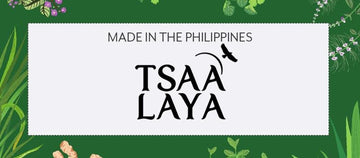
A lot of countries are known for the tea they export to the world: Japan has Matcha, China has Oolong, and India has Darjeeling. Their teas have become so ubiquitous that the association is so easy to make. Matcha has integrated itself into various cuisines and different kinds of black teas are served in restaurants all over the world.
This is where Tsaa Laya’s big vision comes in: to place Philippine tea on the map. In a country with a strong coffee culture as opposed to a tea one, it can be challenging. How does a tea company set itself apart?
But Tsaa Laya is anything but a regular tea brand. What makes it different is the why behind it all. Just like R2R and the world of fashion, it didn’t start out with the focus of breaking into the food and beverage industry. Tsaa Laya was first looking at solving a social problem.

A hundred kilometers away from Metro Manila is the National Housing Authority (NHA) housing project of Calauan, Laguna. It was built for families displaced from the Philippine capital because of city development projects or natural disasters (like Typhoon Ondoy in 2009).
Although the relocated families were provided with shelter and a safer place to live, the area is far from livelihood opportunities, giving the families no sources of income. Jamir Ocampo, the founder of Kapwa Greens, wanted to change that.
Tsaa Laya, under Kapwa Greens, is a social enterprise that employs the women of Calauan to grow local herbs, fruits, and spices and make tea out of them, promoting Philippine plants as modern tea ingredients in the process.

In 2014, the company started with a community farm and transformed three housing units into tea plants. As of late 2016, their tea plantation farm can house 500 kilograms of tea plants at a time and they get a monthly order of at most 100 to 150 kilograms, giving the tea farmers regular and stable income.
"Tsaa Laya focuses on women’s livelihood. I am so proud to see my nanays at the Calauan resettlement area making independent decisions because they now earn income for themselves and do not have to rely on their husbands,” Jamir said of their now-empowered community.
Tsaa Laya offers tea variants that are uniquely Filipino: Lemon Ginger, Tanglad, Pandan, Arvensis Mint, and Java Banaba.

When asked what his favorite variant was so far, Jamir answered, "I like our Arvensis Mint because mint is so far the hardest herb I have worked with. It is like my problem child. And you usually give more attention and love to your problem child. It is so picky with our tropical weather and it has this elusive cooling menthol that you have to take care of during the processing of the tea."
It is this attention to detail and quality that elevates Tsaa Laya as a premium brand. Although their primary goal is to give livelihood to the women of Calauan, the brand also showcases passion in their craft of tea-making and offers excellence to its clientele.

Fans of Tsaa Laya can expect two more tea collections in 2017: the Cordilleran Heritage Teas and their Chocolate Teas.
Jamir pressed on, "One native tea that I’m currently geeking out on is the Gipa tea from our upcoming Cordilleran collection. In plant taxonomy, Gipa is a cousin of Camellia Sinensis so it somehow resembles the taste of classical teas [and it] had been traditionally consumed as a regular, leisure drink by various ethnic groups of the Cordillera. That only means, in contrast to common knowledge, we have our own Filipino tea culture!”
Who knew that a cup of tea could hold so much joy, purpose, and history?

Shop Tsaa Laya teas in our online shop or in the R2R stores at UP Town Center. Tsaa Laya is also being served in local establishments like Bo's Coffee and Mozaic Living.






Hi, I found your website in my search of tea manufacturers in the Philippines. As a cordilleran, I am happy to know that our Gipas herbal tea was chosen as one of your products. And also, I am excited to tell you that there are more native teas that can be found in the cordillera aside from Gipas herbal tea. There are two kinds of mountain tea that I am planning to propagate; the first one is the tea tree which we call it Mountain tea and the other one is the tea that grows like a Lantana which we call it “sibitan”. There are more wild teas that my father is telling me but I want to focus first on these two because they have unique smell and taste compared to others. So please contact me, I want to talk to you more about teas. Thank you
Hi,
I would like to inquire if you can supply black tea in bulk?
Thanks,
Gemma
Hi Good day
We would like to request a samples of your individual tea bags for approval of our Management. Please arrange a Demo in New Coast Hotel Manila. You can contact me at 09565515643
I am looking at buying your tea please send me a list of your tea
Can you please contact me I am very interested in buying and reselling your teas